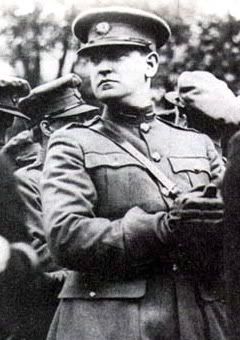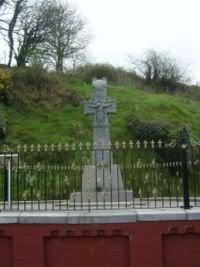 We all have those who inspire us and motivate us to do more, work harder, and achieve more, for me one of my greatest heroes is Irish General and revolutionary leader Michael Collins, who was also affectionately known as "The Big Fellow".
We all have those who inspire us and motivate us to do more, work harder, and achieve more, for me one of my greatest heroes is Irish General and revolutionary leader Michael Collins, who was also affectionately known as "The Big Fellow".There might be those among you who actually know who this man is and know the impact he had on the country of Ireland, its fight against the iron rule of Great Britain, and the subsequent creation of the new Irish Republic.
Born in October 16th 1890 to a relatively well to do family of farmers in the area of Cork County, which just happens to be where my family hails from, which might be part of the reason I so admire him.
At the tender age of 19 he was introduced to the dissent and revolutionary nature of the Irish Republican Brotherhood, which is a secret oath based society dedicated to the liberation of Ireland from the oppressive rule of Great Britain.
Michael Collins first gained notoriety during the failed 1916 Easter uprising of which he took part of mainly because of he was a highly skilled organizer and collector of information due to his personal intelligence network and also because he was so highly respected throughout the Irish Republican Brotherhood.
On Easter Monday 1916 Michael fought alongside the leaders of the rebellion and took over the General Post Office, he was later captured when the rebellion failed after a 6 day siege and was saved the fate of those leaders and did not go to the gallows and ultimately landed himself at Frongoch Internment Camp and was later released.
In the summer of 1919 Michael was elected President of the Irish Republican Brotherhood and shortly after in September was made the Director of Intelligence of the Irish Republican Army.
Using his previous intelligence network he created a special assassination squad called the Twelve Apostles, this unit was specifically created to kill British agents who had been causing trouble for Michael, his followers and of course the cause of Irish independence.
By 1920 The British government offered a bounty of £10,000 for information leading to the death or capture of the 30yr old revolutionary leader Michael Collins.
His popularity was so broad and massive that he transcended the Irish Republican Movement and was given the nickname "The Big Fellow".
In 1921 "The Big Fellow" was sent by President of The Irish Republic, Eamon De Valera, to London to hammer out the details of a treaty that would dictate all that they wished and had been fighting for, the resulting conference led to the Anglo-Irish Treaty which provided for a brand new Irish State.
Michael was under the belief that a full concession by Great Britain was all but unattainable and that De Valera had sent him there for that very reason so he would not be tainted by such a perceived failure.
The resulting tensions from this treaty led directly to the splitting of the Irish Republican Army with some supporting De Valera and set up the Anti-Treaty IRA and the rest of the men following General Michael Collins as Free State troops.
Than in April of 1922 a group of roughly 200 Anti-Treaty IRA soldiers took over and occupied the Four Courts located in Dublin, in direct defiance of the Provisional government.
Michael, who wanted to avoid a full blown civil war at all costs, did not attack the garrison of Anti-Treaty IRA men until June 22nd, when the British forced his hand over the abduction of Free State Irish General J.J. O'Connell.
He made one final attempt to persuade the men to leave peacefully, which was unsuccessful, than Collins borrowed two 18pounder artillery pieces from the British government and than proceeded to bombard the Four Courts until its garrison of Anti-Treaty IRA soldiers surrendered en mass.
These actions led directly to the outbreak of the Irish Civil War , as intense fighting broke out in the capitol of Dublin between the Anti-Treaty Irish Republican Army and the Free State troops and under the Irish Generals leadership the Free State troops quickly took control of the capitol.
It was not long after while supervising an offensive campaign that Collins visited his native Cork, against the orders and wishes of his companions, to meet with several Anti-Treaty leaders in the hopes of ending the bloodshed as quickly as possible, Collins however told his comrades that ," They wouldn't shoot me in my own county".
On August 22nd 1922 Michael Collins luck ran out as he was ambushed in the town of Béal Na mBláth, which in Irish means The Mouth of Flowers, by Anti-Treaty member of the IRA.
 This assault lasted roughly 45 minutes with the only fatality being Collins himself.
This assault lasted roughly 45 minutes with the only fatality being Collins himself.There have been a few books who stated that the bullet that killed "The Big Fellow" was actually fired by a man named Denis "Sonny" O'Neill, who was a former British Army marksmen, Michael was 31 when he died.
He did not have a long life, but yet he did more and accomplished more in his short time than most who live to be a 100 will ever dream of, but his death was a huge and crippling blow to the fighting men on both sides, for he was still highly respected by his enemeis, and for the country of Ireland as a whole.
One can only wonder at what a brave and couragous man would have been able to do if he had only lived for a few more years, surely he would have been able to keep the country from continuing its violent struggle against one another.
The reason he is one of my heroes is that he fought with honor and for the freedom of the country I hold dear in my heart, while I'm an American and not from Ireland I want everyone to know that I'm not Caucasian person or a white person, I'm an Irish-American who is proud of his heritige.
People always talk about slavery and opression as if they are the only ones who have felt it, The Irish people were always the whipping boy of Great Britian and didn't fare much better when they came to this country, but the Irish people worked hard and made a life for themselves.
Michael Collins should be an inspiration to us all not just Irish people.
9 comments:
Good article. Most of us don't pay much attention to this man. I'm afraid I'm one. I'm always ready to learn.
The shame of Ireland.
The 1916 Easter Rising took place while the free world was fighting against the Kaiser's Germany, and Ireland heaped more shame upon this when they chose to remain neutral in the fight against Hitler & Japan just 20 years later.
The Irish did have the vote of course as citizens of the UK, so the 'Iron Rule' you talk about was not quite so Iron as you infer.
Your Hero Collins could more accurately be described as a terrorist. And the fact there was an Irish civil war, makes it clear that there were just as many Irish against Collins as with him.
And remember, the Irish were quite happy to settle in the Britain with it's 'Iron Rule', and to take part in stealing the Native American lands in North America.
Despite our disagreement on this issue, I suppose we just have to accept we have different views on history, and our secure future depends on Irish, English, Americans and all European's around the world working together and supporting each other.
Regards
LBM
Well if you remember correctly the Irish were already being conscripted to go fight in the war, they had no choice in the matter.
Thanks for a good read. And
*:-.,_,.-:*'``'*:-.,_,.-:*'``'*:-.,_,.-:*
Have A God Blessed Week!!!!
Blessings
*:-.,_,.-:*'``'*:-.,_,.-:*'``'*:-.
Thanks for a good read. And
*:-.,_,.-:*'``'*:-.,_,.-:*'``'*:-.,_,.-:*
Have A God Blessed Week!!!!
Blessings
*:-.,_,.-:*'``'*:-.,_,.-:*'``'*:-.
In WWI while Irish soldiers were fighting in the trenches for the freedom of europe, Collins was stabbing them in the backs.
WWII, there were no Irish conscripts from the Republic.
LBM
I was refering to WWI
A few points-
The war, did not originate in the collision of incompatible ideologies. Collins reluctant acceptance of the temporary curtailment of Irish freedom was only slowly translated into the endorsement of the Commonwealth principle voiced by FitzGerald as minister for external affairs, after the ‘Balflour Declaration of 1926. The Civil War erupted because of the weakness and fragmentation that normally restrain armed disputation between civilians. A bit of Irish history from someone who lives
“Well if you remember correctly the Irish were already being conscripted to go fight in the war, they had no choice in the matter.” – Some weeks passed before numbers began to join the 50,000 regular Irish soldiers and reservists that were mobilised on 4 August. 90,000 men were enlisted in Ireland before 1916. The imposition of conscription in Britain but NOT in Ireland saw about 200,000 join the colours in Ireland as well as Irish ex-pats in Britain and the Commonwealth. There was NO WW1 conscription in Ireland.
“The Irish people were always the whipping boy of Great Britain.” The last census of the UK showed there were nearly 750,000 Republic Of Ireland Nationals living on the mainland UK. Hardly being oppressed are they?
I don’t expect you are interested in my version – I’m the wrong kind of Irish.
very interesting.........
Post a Comment